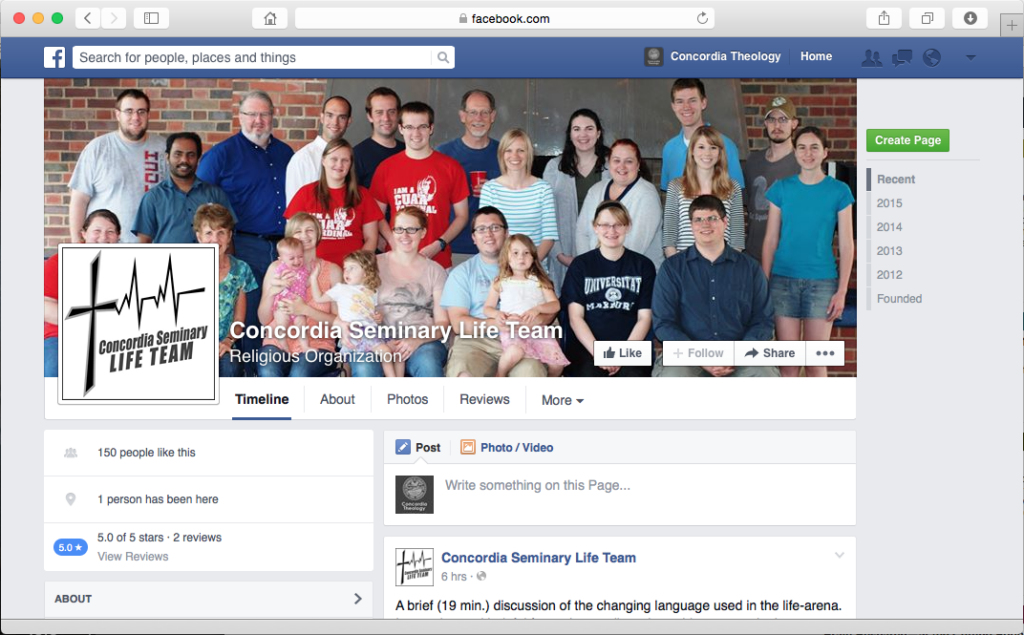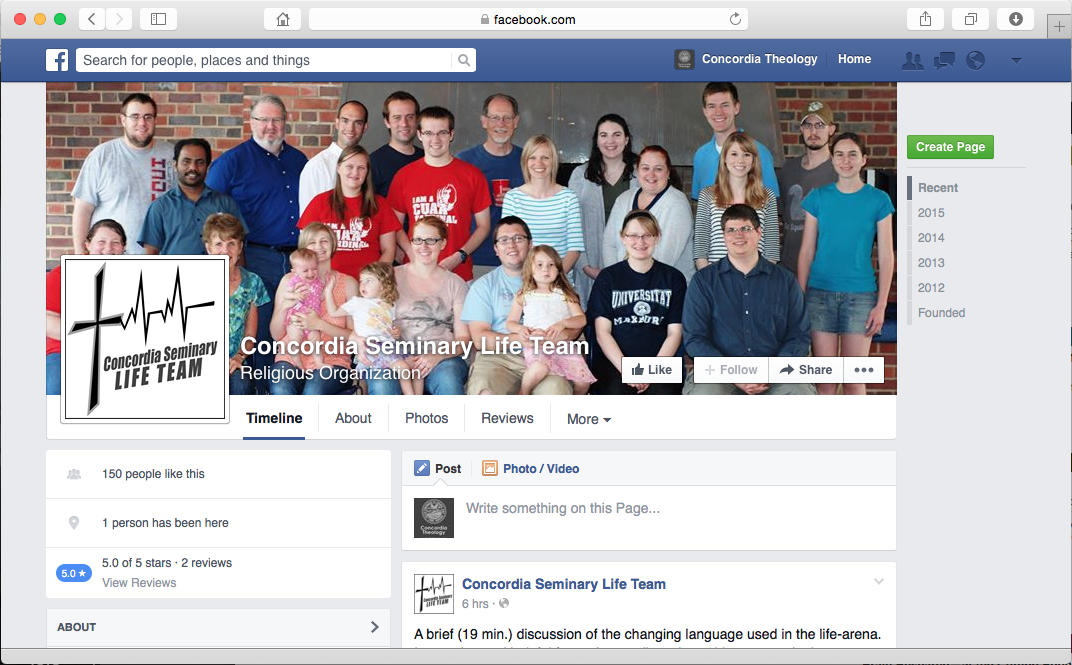 Readers of ConcordiaTheology.org will likely be a fairly life-affirming group, and so most readers of these words will already be aware of the sensational video released this month by the Center for Medical Progress (CMP). The video itself is less than 9 minutes long, and it is deeply troubling in many ways. The CMP also published a sixty-page complete transcript of the lunch meeting that occurred on 7/25/14. During the lunch meeting, two life-affirming “agents” pose as people interested in procuring post-abortive fetal tissue for research purposes. They are conversing with Dr. Deborah Nucatola, Senior Director of Medical Service for Planned Parenthood (PP) Federation of America. After examining these materials and pondering things for a few days, I decided to write a few words under three headings.
Readers of ConcordiaTheology.org will likely be a fairly life-affirming group, and so most readers of these words will already be aware of the sensational video released this month by the Center for Medical Progress (CMP). The video itself is less than 9 minutes long, and it is deeply troubling in many ways. The CMP also published a sixty-page complete transcript of the lunch meeting that occurred on 7/25/14. During the lunch meeting, two life-affirming “agents” pose as people interested in procuring post-abortive fetal tissue for research purposes. They are conversing with Dr. Deborah Nucatola, Senior Director of Medical Service for Planned Parenthood (PP) Federation of America. After examining these materials and pondering things for a few days, I decided to write a few words under three headings.
The Importance of Accuracy
A lot has already been written, especially in quick response to the video. Here I make no claim to addressing every issue, or giving rejoinder to every response. Let me mention briefly, however, the question of accuracy. At all times, of course, Christians should be the first people concerned with the truth, including truthful and accurate reporting. So, I decided to read the full transcript first, and then watched the video. I confess to this conclusion: the video by itself creates a somewhat misleading image of the meeting and its content. To focus only on the main issue with regard to this video, that is, whether PP sells fetal tissue, organs, or “lower extremities” for profit, the transcript lends little clear support that PP does this. For example, the video highlights a statement about a price range “from $30 to $100 per specimen” by the PP official. In the larger context, however, it is clear that the parties are discussing how PP clinics can recover any additional costs they incur by making this gruesome “resource” available to researchers. This is not a conversation about making profit. Clearly, whether PP actually engages in this particular illegal activity cannot be determined on the basis of one such meeting. I will say that this particular meeting, however, is not a smoking gun—not even close. And if you don’t believe me, please read the transcript carefully, and we can talk about what it says.
Is Planned Parenthood breaking the law by marketing for profit the body parts and other tissue from abortions? This is obviously an important question, and it should be answered. The deeper problem, however, is revealed by this fact. The truly sad thing is that if Planned Parenthood were to find itself in hot water as a result of this issue, that trouble would only come because they broke the law that prohibits selling fetal tissue and body parts—for profit. There is no law against donating for research purposes the tissue of an unborn child that has been killed in an abortion. It’s only illegal—if you do it for financial profit. Otherwise, no legal problem for PP. This brings up a second important point, and I am of the opinion that many life-affirming people are not aware of it, so I’ll speak to it briefly.
Acknowledging a Profound Challenge in the Thinking of Many People
An honest and quite sincere Facebook post (yes, there are some of them) asked a question. My friend asked, “How can people condone the selling of the pieces of unborn human beings who have been murdered?” What my friend may not have realized is something that all life-affirming people need to acknowledge: for many Americans, her Facebook post was a clear example of begging the question. This is the logical mistake you commit when you assume the truth of something that, in fact, you need to demonstrate. My Facebook friend assumed that something was true: that abortion murders unborn human beings. And I agree with her, and so (if I may say it) does the Bible. This truth, however, is the very thing that needs to be shown, calmly and clearly persuasively, to many Americans. The basic truth about, indeed, the meaning of the term “abortion” is not clear to many intelligent people today. They do not know the right answer to this question about the unborn: “What is it?” Yes, there are more radical, pro-abortion thinkers who freely acknowledge that the fetus is a human being and they still defend abortion rights. Such people may try to distinguish between a human being (not valuable) and a valuable human person. Or perhaps they don’t even feel the need to do that—they simply privilege the woman’s rights and choices over the life of the other human person living inside her body. I suspect, however, that most Americans do not think in quite such radical terms.
Many of our fellow citizens (and some of our fellow church members!) do not know that human life and personhood begin at conception, and that the unborn child is just that—a human person, a child who should be valued and loved and protected. This means that there is a great need for calm conversation and clear evidence—from science and from Scripture—to help educate, persuade, and teach the truth about what happens every time an elective abortion (i.e., not one done to save the life of the mother) takes place. In terms of Scriptural resources, Lutherans for Life has great materials. In terms of basic science and moral reasoning, I can personally recommend the 5-session curriculum, Making Abortion Unthinkable. The material is completely calm, and quite suitable for a congregational study setting for older teens and adults. The DVDs do all the heavy lifting; any reasonably intelligent Christian could moderate the discussions.
Whether through neglect or laziness or sheer inattention, many people simply do not know the basic truths about what abortion does, and who it is that dies every time an abortion happens. We need to teach this—calmly, compassionately, patiently. Yelling at people, in general, does little good—especially when they do not understand or believe the truth yet. And that brings me to my third observation.
Save Your Outrage—Do Something to Keep the Great Commandment
Maybe sometime soon, I’ll complete that study I’ve said that I want to do: on the nature and role of “anger” in the New Testament. I’ve done enough looking around to know that it won’t be a pretty picture. Anger against a Christian brother or sister is (at least to Jesus) as serious a sin as murder (Matt 5:21-22). To the apostle Paul anger is extremely volatile. Although he seems willing to concede the presence of anger in believers, he immediately follows that concession with a warning not to sin, nor to let anger remain overnight lest it become a launching-off point for Satan in our lives (Eph 4:26-27).
I’ve seen a lot of anger from life-affirming Christians as a response to the PP controversy. On the one hand, I get it. On the other hand, anger is just an easy, lazy, culturally acceptable way to be an American. Americans these days seem to spend their days finding things at which to be outraged or offended. Some things that cause us to be outraged shouldn’t; I suppose some of them are more legitimate. But the outrage, the anger does no one any good.
What does do plenty of good to plenty of people—is love. Love is compassionate, wise action by Christians for the good of their neighbor, the good even of their enemies. So, if I am outraged because I realize the evil things going on in and through and around Planned Parenthood, I should ask myself two questions. First, how can I deal with my anger so that I don’t sin? And second, what acts of love can I do to counter that evil and show concern for everyone involved? You see, Jesus really seems to mean his answer to the Pharisees in Matt 22: “And the second commandment is like (the first): You will love your neighbor as yourself.” Outrage and anger by themselves are nothing, and they can lead quickly to sin. Love, however, is the fruit of the Spirit (Galatians 5), and it is the new way of eschatological life that we are now, however imperfectly, to manifest (1 Cor 13:8-13).
If you are a pastor, or a lay leader, and you would like to know more about a practical way to help your congregation show gracious, loving, Gospel-centered ministry in life arenas issues and not just abortion, then I have a direct suggestion for you. Find out what a Life Team is, what a Life Team can do, and how you get a Life Team started in your congregation. Many pastors and congregations want to do something, but they don’t know how to do it well, graciously, in a trusted and life-giving way that flows from the Gospel and that cares for everyone in need. The Life Team model can help you to do this. Go to www.lutheransforlife.org, click on the scrolling header, “Start Your Own Life Team,” watch the short videos, and contact LFL. We use the model here at Concordia Seminary (check out our Life Team Facebook page). It’s good stuff. It’s far superior to being outraged.


Leave a Reply
You must be logged in to post a comment.